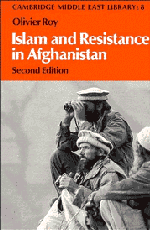Book contents
- Frontmatter
- Contents
- Acknowledgements
- Maps
- Introduction
- 1 State and society in Afghanistan
- 2 Islam in Afghanistan
- 3 The origins of Afghan fundamentalism and popular movements up to 1947
- 4 The Islamist movement up to 1978
- 5 The communist reforms and the repression, 1978–9
- 6 The uprisings, 1978–9
- 7 The establishments of political parties
- 8 The development of the parties between 1980 and 1984
- 9 The role of the Shiʿa in the resistance
- 10 Society and the war
- 11 From freedom fighter to guerilla
- 12 Military operations
- 13 The conflict from 1986 to the Soviet withdrawal
- 14 Cultural patterns and changes in society: an assessment
- 15 Afghan politics and the outside world
- Appendixes
- Notes
- Bibliography
- Index
13 - The conflict from 1986 to the Soviet withdrawal
- Frontmatter
- Contents
- Acknowledgements
- Maps
- Introduction
- 1 State and society in Afghanistan
- 2 Islam in Afghanistan
- 3 The origins of Afghan fundamentalism and popular movements up to 1947
- 4 The Islamist movement up to 1978
- 5 The communist reforms and the repression, 1978–9
- 6 The uprisings, 1978–9
- 7 The establishments of political parties
- 8 The development of the parties between 1980 and 1984
- 9 The role of the Shiʿa in the resistance
- 10 Society and the war
- 11 From freedom fighter to guerilla
- 12 Military operations
- 13 The conflict from 1986 to the Soviet withdrawal
- 14 Cultural patterns and changes in society: an assessment
- 15 Afghan politics and the outside world
- Appendixes
- Notes
- Bibliography
- Index
Summary
The Afghan war reached a turning point in 1988, when Moscow decided to withdraw its troops from Afghanistan whatever the future course of the events. From that point, the Afghan war ceased to embody the conflict between East and West or between Islam and Communism. The ideological dimension of the war faded away, and the traditional domestic factors, mainly communal and ethnic, prevailed. Both the Mujahidin and the Kabul regime reverted to the traditional rules of the power game, although the changes brought by the war, mainly accumulation of modern weapons, emergence of a new leadership, politicisation of the society, massive emigration and urbanisation, undermined the traditional ways of regulating the conflicts which opposed communal groups to each other or to the state. Instead of providing an alternative model of modern state power, these changes plunged Afghanistan, just after the Soviet departure, into anarchy. On the same time, this creeping “lebanonisation ” of Afghanistan became a stake in the regional game, where Pakistan, Iran, India, Saudi Arabia, but also the Soviet Union, are playing their regional cards, enhancing what they see as their national interests through what they see as their Afghan proxies. But, as usual, every foreign player who tries to impose his strategy on any Afghan player finds himself bogged down by the Afghan domestic factors.
- Type
- Chapter
- Information
- Islam and Resistance in Afghanistan , pp. 207 - 214Publisher: Cambridge University PressPrint publication year: 1990



